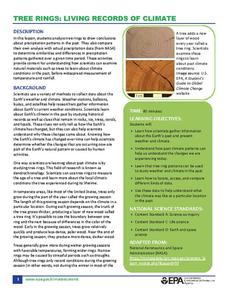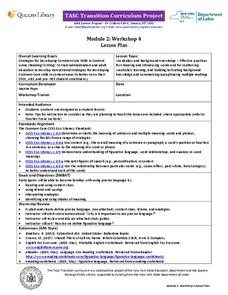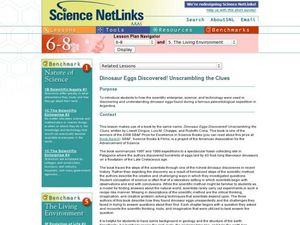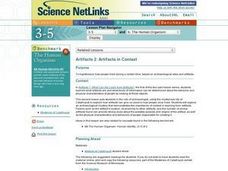K12 Reader
World Climates
Why is weather different around the world? Learn about world climates with a reading comprehension passage. Kids read a short passage before answering five comprehension questions based on context clues.
Curated OER
EEEK! A Spider!
Youngsters complete a unit of lessons based on the story "Little Miss Muffet." They predict what will happen in the story, and use context clues to look for meaning in the words. They research information about spiders using the Internet...
K12 Reader
Phases of the Moon
Take one giant leap for mankind with a reading passage about the moon. Kids learn about the lunar cycle with context clues and reading comprehension questions, making it a good informational text for your language arts lesson.
Curated OER
Old Lady That Swallowed a Fly
Youngsters listen to the story, "There Was an Old Lady Who Swallowed a Fly." After discussing the story, going over new vocabulary, and repeating the rhymes in the story, they study the parts of a fly. They finish by creating a fly on...
K12 Reader
Why Does the Moon Orbit Earth?
Have you ever looked up at the moon and wondered why it looks different every night? Learn about the moon's orbit and the lunar cycle with a reading comprehension exercise. Using context clues, kids find the definitions of unfamiliar...
EngageNY
Mid-Unit Assessment: Close Reading of Bullfrog at Magnolia Circle: Bullfrog Life Cycle
The sixth lesson plan in this Bullfrog at Magnolia Circle unit assesses your third graders' ability to read and understand informational text. The included assessment asks learners to take notes about the main idea and supporting...
US Environmental Protection Agency
Tree Rings: Living Records of Climate
Open with a discussion on weather and climate and then explain how tree rings can provide scientists with information about the earth's past climate. Pupils analyze graphics of simulated tree rings from various US locations for the...
New York State Education Department
TASC Transition Curriculum: Workshop 4
Why is it important to use precise language? Participants explore this question in the fourth activity in a series of 15 on effective instruction. Perfect for all content areas, the activity promotes appropriate language choice through...
Curated OER
Exploring Arizona's Biotic Communities Lesson 2: Biotic Communities Vocabulary
Part of a unit on Arizona's biotic communities, this activity focuses on the vocabulary to be used. Terms include biodiversity, topography, desert, hybridization, niche, and more! Youngsters will define these words from contextual...
San Francisco Public Utilities Commission
What is Drought? No Rain, No Water
How can climate change affect our water supply? Have kids read a passage about the water cycle and water conservation, which includes six questions that challenge them to use context clues.
Curated OER
Dinosaur Eggs Discovered! Unscrambling the Clues
Just a heads up: this instructional activity is based on a book, Dinosaur Eggs Discovered! Unscrambling the Clues. If you do not have or do not want to purchase the book, you may still find the other activities and worksheets useful...
Curated OER
Contextual Clues
Students observe and interpret images of artifacts in different contexts in order to recognize importance of leaving artifacts in original context to correctly understand their meaning, and observe what is surrounding object to interpret...
Curated OER
Artifacts 2: Artifacts in Context
Students explore world history by completing artifact worksheets. In this archaeology instructional activity, students identify the importance of finding clues when researching historical information by utilizing artifacts. Students...
Curated OER
Artifacts 2: Artifacts in Context
Learners will explore an archaeological mystery that demonstrates the importance of context in learning from artifacts. Factors such as the artifact's location, its proximity to other artifacts, and the number of similar artifacts found...
Curated OER
Life's Lessons: Survival of the Fittest
Students analyze Jack London's use of anthropomorphism to identify the importance of adaptability in life. In this literature lesson, students use the novel The Call of the Wild to identify key elements in survival. Students...
Curated OER
Native American Culture
Students read a variety of Native American Literature and discuss the main idea by answering critical thinking questions about the poem. Students use context clues to understand the feeling of the Native American culture about the Earth....
Curated OER
Flight of the Future/Space Flight
Young scholars explore space science by viewing videos on YouTube. In this moon landing instructional activity, students view clips of Neil Armstrong taking his first step on the moon and discuss the space race between the U.S. and...
Curated OER
Artifacts 1: What Can We Learn From Artifacts?
Sixth graders are introduced to artifacts and explore an online archaeological site to connect clues about how people once lived. In this deductive reasoning lesson, 6th graders participate in the stratigraphy game on Kids Dig...
Curated OER
Where is Shirley the Elephant?
Young animal lovers engage in a lesson that's all about elephants. They access an elephant sanctuary website and read a story about Shirley the elephant. They perform a series of activities based upon that story, and also study about the...
Curated OER
Technology and Oil
Students demonstrate how much our society depends on petroleum products. They show how advances in technology have allowed us to find, obtain, and transport oil more efficiently.
Curated OER
Solar System: Let's Take a Trip
Third graders consider outer space. In this introductory solar system lesson, 3rd graders complete a KWL chart and listen to the story The Magic School Bus: Lost in the Solar System, by Joanna Cole & Bruce Degen. They will contribute...
Curated OER
What Can We Learn from Artifacts?
Learners examine how artifacts are discovered and explore their significance as it pertains to gathering important information. In this artifacts lesson plan, students obtain knowledge about the way artifacts are excavated and examine an...
Curated OER
My Senses Tell Me...
Students explore how to use their sense to draw conclusions. In this human biology lesson, students use their senses to observe various objects in learning centers. The centers include tasting salt, touching sandpaper, hearing bells...























